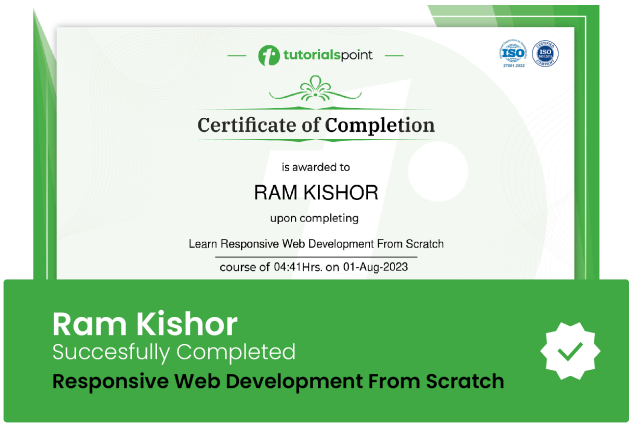Good Content
Data Warehouse Course: Basic to Advanced Concepts
Data Warehouse Concepts: Learn the BI/Data Warehouse/BIG DATA Concepts from scratch and become an expert.
Lectures -120
Duration -6.5 hours

30-days Money-Back Guarantee
Get your team access to 10000+ top Tutorials Point courses anytime, anywhere.
Course Description
You will study all the terms and ideas linked to the Data Warehouse in this course, including OLTP, OLAP, Dimensions, Facts, and many more, as well as other concepts associated with it, such as what Start Schema and Snowflake Schema imply, as well as other alternatives and their distinctions.
Data Warehouse: Basic to Advanced Concepts Overview
Data Warehouse: Basic to Advanced Concepts Course will help you understand facts, dimensions, aggregations, and frequently employed ETL approaches. Additionally, it describes how the Data Warehouse manages data and how to read and write data into the Warehouse.
After finishing this course, you will have a solid understanding of all the Data Warehouse principles, which should be enough to set you on the path to becoming an ETL developer or administering the Data Warehouse environment with the aid of various tools.
Why Learn Data Warehouse?
There are many reasons why you should learn data warehouse. Here are some of the most important ones:
Data warehouses are essential for businesses of all sizes. They provide a centralized repository for data, which can be used to make better decisions, improve operations, and drive innovation.
Learning data warehouse can help you develop valuable skills in data analysis and business intelligence. These skills are in high demand and can lead to lucrative careers in the tech industry.
Data warehouse is a complex subject, but it is also very rewarding. By learning data warehouse, you will gain a deep understanding of how data is stored, managed, and analyzed. This knowledge can be used to solve real-world problems and make a positive impact on the world.
Goals
What will you learn in this course:
Brief about the Data Warehouse and how the concept came into existence
Business Intelligence Concepts
Data Warehouse Architectures
ODS - Operational Data Store
OLAP - Online Analytical Processing
Data Marts
Metadata
Data Modeling
Entity Relationship Model
Dimensional Model
Data Integration & ETL
ETL vs ELT
ETL - Extraction Transformation & Loading
Typical Roles in a Data Warehouse Project
DW/BI/ETL Implementation Approach
Prerequisites
What are the prerequisites for this course?
Basic understanding of the IT (Software) industry.
Familiar with the basic concept of Database/RDBMS.

Curriculum
Check out the detailed breakdown of what’s inside the course
Brief about the Data warehouse
4 Lectures
-
Is Data Warehouse still relevant in the age of Big Data? 04:25 04:25
-
Why do we need a Data Warehouse? 05:26 05:26
-
What is a Data Warehouse? 05:48 05:48
-
Characteristics of a Data Warehouse 05:43 05:43
Business Intelligence
4 Lectures

Data Warehouse Architectures
8 Lectures

ODS - Operational Data Store
4 Lectures

OLAP
7 Lectures

Data Mart
6 Lectures

Metadata
6 Lectures

Data Modeling
2 Lectures

Entity Relational Data Model
14 Lectures

Dimensional Model
21 Lectures

DWH Indexes
4 Lectures

Data Integration and ETL
3 Lectures

ETL Vs ELT
3 Lectures

ETL - Extraction Transformation & Loading
3 Lectures

Typical Roles In DWH Project
13 Lectures

DW/BI/ETL Implementation Approach
18 Lectures

Instructor Details

Inf Sid
eCourse Certificate
Use your certificate to make a career change or to advance in your current career.

Our students work
with the Best


































Feedbacks
Related Video Courses
View MoreAnnual Membership
Become a valued member of Tutorials Point and enjoy unlimited access to our vast library of top-rated Video Courses
Subscribe now
Online Certifications
Master prominent technologies at full length and become a valued certified professional.
Explore Now


 Updated on Apr, 2024
Updated on Apr, 2024
 Language - English
Language - English
